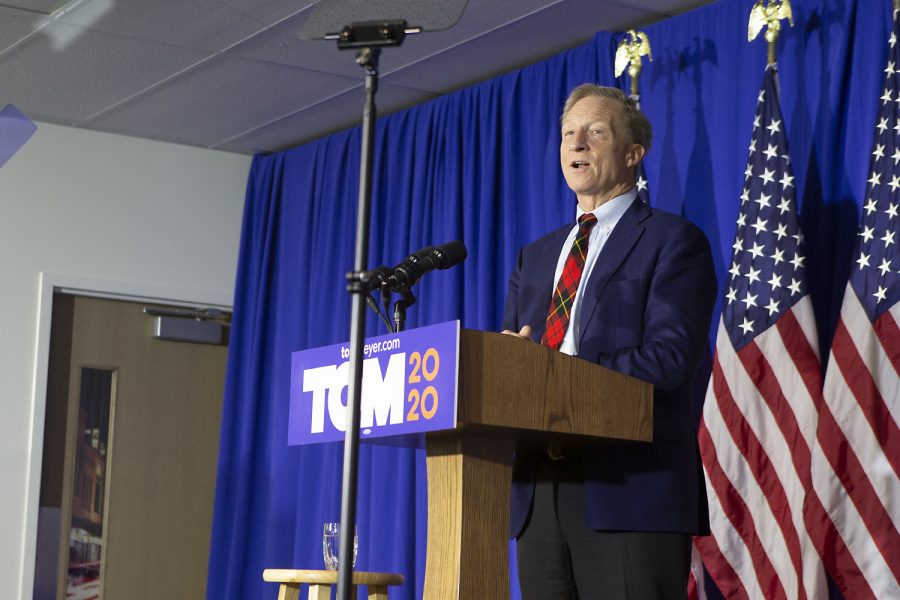Tom Steyer in Iowa: The candidate who’s best on the economy will beat Trump
Tom Steyer has plastered the airwaves in Iowa touting his ability to “go head-to-head with Trump on the economy”. In Iowa City on Monday, Steyer heavily emphasized his wealth and corporate experience as an asset to his ability to govern — not as a liability.
December 16, 2019
At a campaign stop Monday, billionaire and Democratic candidate Tom Steyer portrayed his experience running a multibillion-dollar business as the key to defeating President Trump in a general election.
Steyer, who retired from managing the investment firm he founded, Farallon Capital, in 2012, said he offers an inside perspective into releasing the “corporate stranglehold” on the U.S. economy.
“I know what it takes to break the corporate stranglehold on our democracy, the same takeover that keeps us from a government which is truly of, by, and for the people,” he said under bright lights in front of TV cameras and to a room of about 40 people at a downtown Iowa City co-working space called MERGE.
As of October, Steyer had put about $47 million of his own money on his presidential run, according to Federal Elections Commission records. He’s fielded questions, including one at the last presidential debate, about how he responds to the apparent paradox of working to achieve his goal to get money out of politics by spending much of his own money on political campaigns, interest groups, and his own candidacy.
He distanced himself from President Trump’s business credentials on Monday, saying he was not “handed a dime” by his family, instead growing his business from zero.
“I started my business from scratch in a one-room office with no windows for nearly three decades, I grew my company into a multibillion dollar international enterprise,” he said. “I spent 30 years studying our economies and economies around the world. And I know what makes them work.”
In response to a reporter’s question, Steyer said he’s not proposing the government to be run like a business, but he is using his wealth for the benefit of the country, unlike what he views as self-interested corporations and wealthy individuals.
“Actually understanding what drives the economy is incredibly important for the president,” he responded. “… So what we’re talking about is ‘Can we continue growth overall but in a way that shares it across society so that people get the benefit of their participation and their contribution to American growth and prosperity?’ ”
Steyer said that while he has respect for the four leading candidates — Pete Buttigieg, Elizabeth Warren, Joe Biden, and Bernie Sanders — he doesn’t think any of them could beat Trump or grow the economy as president while ensuring workers’ rights because none of them had built or run a successful international business.
“None of them has a private-sector track record of creating jobs,” he said. “None of them has firsthand experience growing wealth … I do.”
In his economic plan, Steyer supports raising the federal minimum wage to $15 an hour, establishing congressional term limits, and imposing a wealth tax of 1 percent on those whose net worth is above $32 million.
Also in his economic plan — Steyer would repeal Trump’s tax cuts, make two years of college free nationwide, and forgive student-loan debt for teachers and other public employees.
“In 2020, Democrats have the chance to end this,” he said. “But as I said, only if we nominate a Democrat who can take the fight to Republicans and to Donald Trump on the economy.”
In 2010, Steyer and his wife pledged to give away half of their fortune to charitable causes. In the following years, he founded climate-advocacy group Nextgen Climate, which grew to be a young-voter turnout effort in 2018, and Need to Impeach, a campaign advocating to impeach the president.
Eric Johnson, 39, of Johnson County, who turned out to see Steyer because of his interest in candidates’ climate change policies, calls Steyer a “leader” on climate change. He asked Steyer if, like other presidential hopefuls, he would include in his plan a carbon tax, whose revenue could be distributed to taxpayers.
Steyer said he didn’t oppose a price on carbon, but he didn’t want to make a similar proposal the epicenter of his plan to combat the effects of climate change. He opted instead to focus on stricter regulations for the fossil-fuel industries.
Climate change has also been a major plank in Steyer’s advocacy and run for president. He’s pledged that on “Day 1” of a Steyer presidency, he would declare a climate emergency.
Johnson, whose family farms in southeastern Iowa, said he didn’t quite agree with Steyer’s assessment that a price on carbon wouldn’t change behavior. Johnson fears that additional regulations could be chipped away at under a Republican administration or watered down during horse trading.
Johnson hasn’t yet settled on whom to caucus for. He said he likes Warren and Sanders but is concerned a more liberal candidate could result in a win for Trump in the general election. He cited the recent UK election, in which Boris Johnson and the Conservative Party won a majority.
Jolli Odele, 28, who runs an e-waste business at MERGE, still shops for a candidate to support in the February Democratic caucuses. In 2016, he supported Sanders but said he wants to do more research into other 2020 candidates’ environmental policies before he makes a decision.
“The two biggest things I look for is how they plan to grow renewable resources like sustainability and how do we help students that have college student-loan debt — how do we correct that system?” he said.
This is Steyer’s second trip to Iowa City in the last two weeks. At his last campaign stop, he said he would support publicly funded campaigns.



